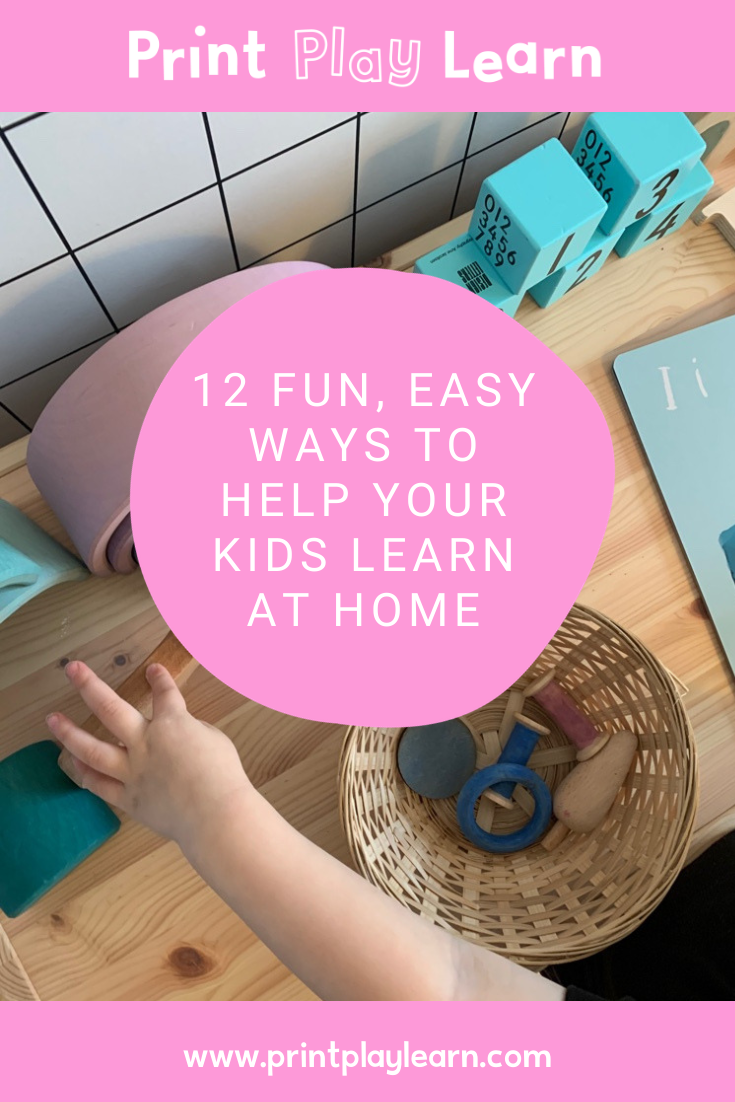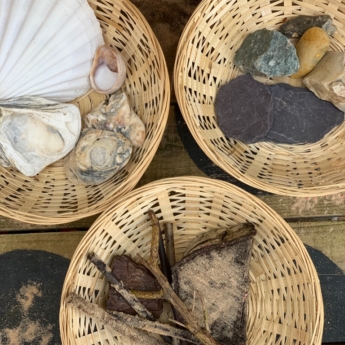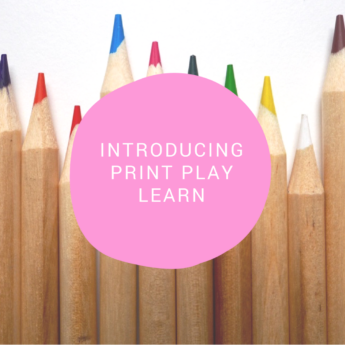Whether it’s the looming Easter holidays or that virus (of which I won’t speak…) many parents are looking for ways to keep the kids entertained AND help them learn, and the good news is – it doesn’t have to be hard. Here are Print Play Learn’s top stress-free ways to help educate your children while they have fun!
Let them free play
The holidays can be a testing time, but unexpected time with your kids when you have the added pressure of ‘educating’ them may cause added stress. Try not to panic! Be kind to yourself and remember that our children are learning all the time, particularly when they play. If your children are happy to be left using their imagination and playing with their toys, don’t feel the need to stop and come up with a more ‘educational’ activity. They’re working hard and aiding their development in the process.
Set-up invitations to play
When your children do need more direction (and you want to stop the ‘I’m bored’ moans) try setting up a simple invitation to play. Put their toys in a different place, line them up mysteriously or pop out some playdoughs and a printed playdough mat to prompt their curiosity. Playdough is great for little children as it helps with fine motor skills needed for handwriting, boost imagination and provides a sensory experience which can ease tension.
If you need ideas for invitations to play, these accounts are a must follow:
@PlayHooray Play Prompts
@FiveMinuteMum
@MrsMactivity
@ResolveToPlay
@OurSensoryKids
@MamaBrownAndCo
@TheWorkSpaceForChildren
Plus I particularly like this brilliant blog post on ways to keep the kids entertained at home from
@InkandTot
Board games & puzzles
If you are in need of quiet time, doing board games together or getting out their puzzles is a nice idea – there are so many skills which can be learnt at the same time, from numeracy to strategic thinking!
These games all come highly recommended for young children:
Swift Playgrounds – coding
Monza – coding
Rhino Hero – fine motor skills
Dragon’s Breath – maths, fine motor skills
My First Stone Age – strategy
Dobble – observation
Uno – numeracy
Rory’s Story Cubes – literacy
Practice mindfulness together
Anxiety is a true fun stopper… If either you or your children are feeling anxious, try doing something mindful together. Colouring is a brilliant distraction tool and also great for practising fine motor skills, or you could watch Yoga YouTube videos like Cosmic Kids for a giggle and to learn about how to calm our minds and bodies (such a crucial life skill).
Garden together
If you’ve got an outdoor space, getting outside together is a lovely way to learn. You can chat through what wildlife you have in your garden, teach them how to do basic gardening tasks like watering plants and weeding. Simply being outside can be used as a good prompt to learn about all sorts of things from plants to the water cycle, seasons to animal habitats.
Let them help around the house
Let’s face it, if it’s one thing schools don’t help our kids with it’s how to run a household. Extra time at home is a great chance to introduce your children to how things work and encourage them to try their hand at age appropriate chores.
Cooking
One of the ways most kids LOVE to help around the house… cooking. Allow your children to help you prep dinner or bake muffins together, there’s so much to learn from measuring out ingredients to learning about the differences in fruits and vegetables or why cakes rise.
Water play
For another simple way to get them having fun (and benefit their development) water play is always a hit. It can be as simple as giving them a bath at the ‘wrong time’ and letting them have extended play or setting up a loads of empty containers and a jug of water for pouring fun! Playing with water is another great way to help them with sensory processing, motor skills and mathematical and scientific thinking (Will this float or sink? Will the contents of this fit into that?)
Read together
Whether your child is able to read yet or not, reading together is a beautiful way to help your child learn. Simply listening to you read is brilliant for building literacy skills and helping them on their journey as a reader, plus it’s a lovely way to bond and hear their opinions and ideas on stories or factual topics.
Get out the pens
If you want your child to practice their handwriting, take the pressure off by encouraging it in their play. Have pens and paper easily accessible so they can create when inspiration strikes or as part of their role play.
Mini Writers Club do a fantastic phonics box to help encourage both reading and writing too.
Print and play!
If you’re wanting to get your children engaged with numeracy and literacy while at home, we’ve got you covered. Fire up your printer and take your pick from the Print Play Learn resources! We’ve got memberships to suit everyone and a free resource pack when you sign-up. All our resources are designed to be simple and joyful encouraging your kids to engage in open-ending play while aiding the learning objectives of the national curriculum.
Relax and connect
One final big tip for helping your children learn at home? Be kind to yourself and focus on connection. You don’t need to try to reenact school at home for your children to learn and thrive. Be present, be encouraging and have fun, knowing that they’ll learn best when they feel safe and relaxed, and know you are too.
If you enjoyed this blog, you might enjoy our Spring specific activity post full of ideas to engage little minds this season.
PLUS, Print Play Learn is offering 25% off our yearly memberships this Spring! To access our simple, joyful educational resources at this price use the code ‘spring25’ at the checkout.


